'Dumbo' Producers Justin Springer & Ehren Kruger Talk About The Challenges Of Adapting The Animated Classic For Modern Audiences [Interview]
Last week, I had the opportunity to sit down with producer Justin Springer and screenwriter/producer Ehren Kruger about their new film, director Tim Burton's live-action remake of Dumbo.
During the chat, we talked about the challenges in adapting Dumbo for modern audiences, the progressive animal rights message of the film, making a remake and a sequel at the same time, the possibility of a connected live-action Disney universe, inspiration from Walt Disney's Disneyland, and more, including updates on Tron 3, which Springer has been developing for years.
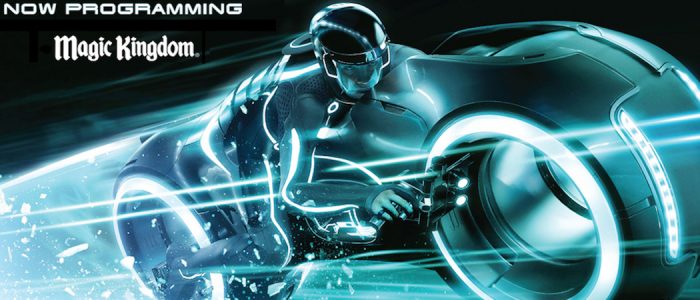 Before we begin, I have to ask you, what's going on with Tron 3?Justin Springer: Yeah, I knew you were going to ask. Look, I will never stop being interested in making a Tron movie. I love the opportunity to do it. It's a title that never really goes away internally. There are always people around the company who like it a whole lot. And so, we'll see what happens. It would be great to get the opportunity to do it again. And I think It's interesting. I think what I will say is that I think it continues to be relevant both in its ideas and also the visual iconography of it. I think people are still are interested in it and it still feels contemporary to me. So it's just about finding the right time, right script and the right people at the studio saying "yes." All you need is fan demand.Well, I feel like if they're opening up that Tron coaster in multiple Disney theme parks around the globe, it makes it easy to say yes.Justin Springer: Hopefully. Hopefully so.
Before we begin, I have to ask you, what's going on with Tron 3?Justin Springer: Yeah, I knew you were going to ask. Look, I will never stop being interested in making a Tron movie. I love the opportunity to do it. It's a title that never really goes away internally. There are always people around the company who like it a whole lot. And so, we'll see what happens. It would be great to get the opportunity to do it again. And I think It's interesting. I think what I will say is that I think it continues to be relevant both in its ideas and also the visual iconography of it. I think people are still are interested in it and it still feels contemporary to me. So it's just about finding the right time, right script and the right people at the studio saying "yes." All you need is fan demand.Well, I feel like if they're opening up that Tron coaster in multiple Disney theme parks around the globe, it makes it easy to say yes.Justin Springer: Hopefully. Hopefully so.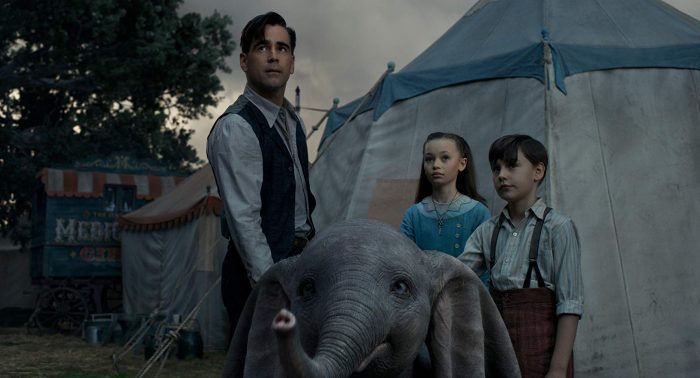 What is the biggest challenge in adapting A film like Dumbo?Ehren Kruger: I think the biggest challenge was to find a way to tell what is a kinda classic mythological story, a simple fable in a way that felt very relevant for a modern audience, while maintaining that sweetness and optimism and positivity and sense of wonder from the original. It was finding that balance. And I think Tim's vision for it helps it feel very modern. And I think there's a lot to talk about the themes of the movie in terms of what is our world and when compared to that circus world of 1919.I was actually kind of surprised that some of the messaging of the movie, not in that it's not Disney-like, but it is so strong and modern. Especially as someone who never really thought about the dynamics of the circus and how that affects animals treatment. Was that always part of the pitch?Ehren Kruger: Yeah. The finished film storywise is very much what the original pitch was. A lot of it's in the original.Justin Springer: A lot of it's in the original story, and I think that that's what Ehren brings to this movie. And I think what you always kind of bring when we talk about things, it's just like, what worked so well in the original film and what it was really about? What are those themes and ideas that were being explored years ago that have kept it in the zeitgeist for all that time? Who is dumbo as a character? Whether they remember all the details of the film or not, [audiences] remember the emotionality of that film. They remember the relationship between the baby and the mom. They remember the outsider qualities of that character and the thing that is looked at as a flaw becomes a superpower. Like all these things that are quite classic and memorable and make him kind of an icon for outsiders, and sort of an icon for belief in magic in a way for the company. How do we honor all that stuff? And it's, it is there in the details. And then there's things about the circus aspect of the film that just feel like, how do you contemporize that for a modern audience and really talk about within the circus world, how are animals, not just the animals, but performers, how should they be treated by the people who, who run these things? And I think that's very much in the DNA of the story. But I think a lot of that's in the original story, a kind of classic storytelling sense kind of emerged.Ehren Kruger: Well, also just as a screenwriter and trying to get inside the head of the hero of your story. What, what does Dumbo want? What is Dumbo's journey? Who does he want to be? What kind of life does Dumbo want to live?
What is the biggest challenge in adapting A film like Dumbo?Ehren Kruger: I think the biggest challenge was to find a way to tell what is a kinda classic mythological story, a simple fable in a way that felt very relevant for a modern audience, while maintaining that sweetness and optimism and positivity and sense of wonder from the original. It was finding that balance. And I think Tim's vision for it helps it feel very modern. And I think there's a lot to talk about the themes of the movie in terms of what is our world and when compared to that circus world of 1919.I was actually kind of surprised that some of the messaging of the movie, not in that it's not Disney-like, but it is so strong and modern. Especially as someone who never really thought about the dynamics of the circus and how that affects animals treatment. Was that always part of the pitch?Ehren Kruger: Yeah. The finished film storywise is very much what the original pitch was. A lot of it's in the original.Justin Springer: A lot of it's in the original story, and I think that that's what Ehren brings to this movie. And I think what you always kind of bring when we talk about things, it's just like, what worked so well in the original film and what it was really about? What are those themes and ideas that were being explored years ago that have kept it in the zeitgeist for all that time? Who is dumbo as a character? Whether they remember all the details of the film or not, [audiences] remember the emotionality of that film. They remember the relationship between the baby and the mom. They remember the outsider qualities of that character and the thing that is looked at as a flaw becomes a superpower. Like all these things that are quite classic and memorable and make him kind of an icon for outsiders, and sort of an icon for belief in magic in a way for the company. How do we honor all that stuff? And it's, it is there in the details. And then there's things about the circus aspect of the film that just feel like, how do you contemporize that for a modern audience and really talk about within the circus world, how are animals, not just the animals, but performers, how should they be treated by the people who, who run these things? And I think that's very much in the DNA of the story. But I think a lot of that's in the original story, a kind of classic storytelling sense kind of emerged.Ehren Kruger: Well, also just as a screenwriter and trying to get inside the head of the hero of your story. What, what does Dumbo want? What is Dumbo's journey? Who does he want to be? What kind of life does Dumbo want to live?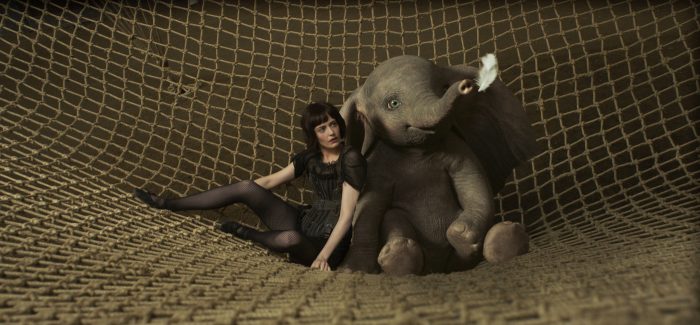 You're also in the unique position that the animated original is like an hour long. So you are making both an adaptation but also sequel at the same time.Ehren Kruger: Yeah, it goes back to trying and put myself in Dumbo's mind as a protagonist of the film. Does it feel like a proper ending to end where the 1941 film did? It was wonderful to be able to explore what would happen in the next step.Do you think it felt like a proper ending back then, but now it probably doesn't?Ehren Kruger: Yeah, very much so. Very much so at the time. And that spirit is in both films; they end on a note of triumph, right? It just takes different forms.Justin Springer: Also, I think there's an opportunity with these remakes to both kind of honor what was great about the original, but the other thing that I always think about is also like what's the new opportunity? What was the missed opportunity? What can we different? What would I have wanted out of it? It's just like, well then what happens? Once he reveals himself to be a flying elephant and everyone's cheering, and now the world knows that we live in a world where there's an elephant that can fly, how does the world react to that? And how is that good for Dumbo or maybe bad for Dumbo? How's that good and bad for the people around them? How does it affect the world at large? And that film was never really about exploring that, but it just felt like in looking back, if we're going to do it again, if we're going to go back and reimagine that story, what if we use more of our film to explore that larger question, which just feels like a big opportunity if you're going to go back and do it.
You're also in the unique position that the animated original is like an hour long. So you are making both an adaptation but also sequel at the same time.Ehren Kruger: Yeah, it goes back to trying and put myself in Dumbo's mind as a protagonist of the film. Does it feel like a proper ending to end where the 1941 film did? It was wonderful to be able to explore what would happen in the next step.Do you think it felt like a proper ending back then, but now it probably doesn't?Ehren Kruger: Yeah, very much so. Very much so at the time. And that spirit is in both films; they end on a note of triumph, right? It just takes different forms.Justin Springer: Also, I think there's an opportunity with these remakes to both kind of honor what was great about the original, but the other thing that I always think about is also like what's the new opportunity? What was the missed opportunity? What can we different? What would I have wanted out of it? It's just like, well then what happens? Once he reveals himself to be a flying elephant and everyone's cheering, and now the world knows that we live in a world where there's an elephant that can fly, how does the world react to that? And how is that good for Dumbo or maybe bad for Dumbo? How's that good and bad for the people around them? How does it affect the world at large? And that film was never really about exploring that, but it just felt like in looking back, if we're going to do it again, if we're going to go back and reimagine that story, what if we use more of our film to explore that larger question, which just feels like a big opportunity if you're going to go back and do it.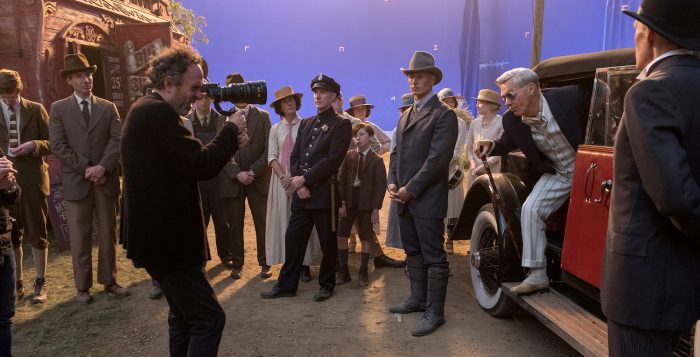 Was there ever any talk of making connections, a connected Disney animated live-action cinematic universe? I mean, they're making Pinocchio. Dreamland would be a perfect Pleasure Island.Ehren Kruger: On Monday we'll be pitching a Dumbo/Captain Marvel crossover picture, but I don't expect them to sign up for it.Justin Springer: What I love, and this is maybe not exactly your question, but I actually love that this story takes place predominantly in a real world and that was really important from the beginning. The original was a contemporary telling of the Dumbo story in the real world. At that point, there weren't other Disney movies that had been set in a contemporary time or really took place in the real world. And with this one, that was when Ehren and I first started talking about it, something that you said that really struck me, which is just, how do we tell a story that gives the audience that same sense of wonder and feeling of magic and the possibility of that, but put it in a reality that feels like it makes it possible in our own lives or at least in our somewhat recent history. And that felt really interesting to me. And so I like that it sort of does live outside of a fantasy world or a fantastical world and really finds itself more grounded in a reality. It's a reality where there can be a flying elephant as imagined by Tim Burton. And so everything kind of pushes into a slightly magical space. His version of Dreamland is the most kind of magical and extravagant version of what Coney island ever, but it's still meant to feel like a place that existed in 1919.
Was there ever any talk of making connections, a connected Disney animated live-action cinematic universe? I mean, they're making Pinocchio. Dreamland would be a perfect Pleasure Island.Ehren Kruger: On Monday we'll be pitching a Dumbo/Captain Marvel crossover picture, but I don't expect them to sign up for it.Justin Springer: What I love, and this is maybe not exactly your question, but I actually love that this story takes place predominantly in a real world and that was really important from the beginning. The original was a contemporary telling of the Dumbo story in the real world. At that point, there weren't other Disney movies that had been set in a contemporary time or really took place in the real world. And with this one, that was when Ehren and I first started talking about it, something that you said that really struck me, which is just, how do we tell a story that gives the audience that same sense of wonder and feeling of magic and the possibility of that, but put it in a reality that feels like it makes it possible in our own lives or at least in our somewhat recent history. And that felt really interesting to me. And so I like that it sort of does live outside of a fantasy world or a fantastical world and really finds itself more grounded in a reality. It's a reality where there can be a flying elephant as imagined by Tim Burton. And so everything kind of pushes into a slightly magical space. His version of Dreamland is the most kind of magical and extravagant version of what Coney island ever, but it's still meant to feel like a place that existed in 1919.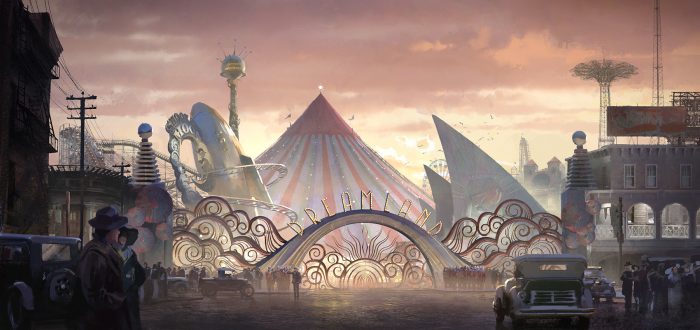 I'm a big Disney parks fanatic, and I mean there are obvious parallels between Dreamland and Disneyland, but I mean, you know, he's no Walt Disney. But there's references and stuff. How do you balance that because you're making a film for Disney that makes a lot of theme parks?Ehren Kruger: Some of the themes of the villains, the antagonist's story in this movie are not exclusive to Disney or not exclusive to entertainment. There are issues of corporate responsibility in the world – what kind of company do you want to be and if you are so lucky to own a business empire, what should that look like?Justin Springer: Even from the outset, Dreamland as a concept was that it was a really early concept in the pitch. And then I remember us looking at research all the way back to it... like it's more PT Barnum or who are the other entrepreneurs that were setting up Coney Island amusement parks at that time or even before. Or what was George Westinghouse doing in that timeframe? There were other reference points outside of entertainment, and we were more looking at that time period than any other time period after. Some people will draw the comparison, but it wasn't something that we were really considering whatsoever. It just feels like kind of a universal corporate responsibility sort of story there.
I'm a big Disney parks fanatic, and I mean there are obvious parallels between Dreamland and Disneyland, but I mean, you know, he's no Walt Disney. But there's references and stuff. How do you balance that because you're making a film for Disney that makes a lot of theme parks?Ehren Kruger: Some of the themes of the villains, the antagonist's story in this movie are not exclusive to Disney or not exclusive to entertainment. There are issues of corporate responsibility in the world – what kind of company do you want to be and if you are so lucky to own a business empire, what should that look like?Justin Springer: Even from the outset, Dreamland as a concept was that it was a really early concept in the pitch. And then I remember us looking at research all the way back to it... like it's more PT Barnum or who are the other entrepreneurs that were setting up Coney Island amusement parks at that time or even before. Or what was George Westinghouse doing in that timeframe? There were other reference points outside of entertainment, and we were more looking at that time period than any other time period after. Some people will draw the comparison, but it wasn't something that we were really considering whatsoever. It just feels like kind of a universal corporate responsibility sort of story there.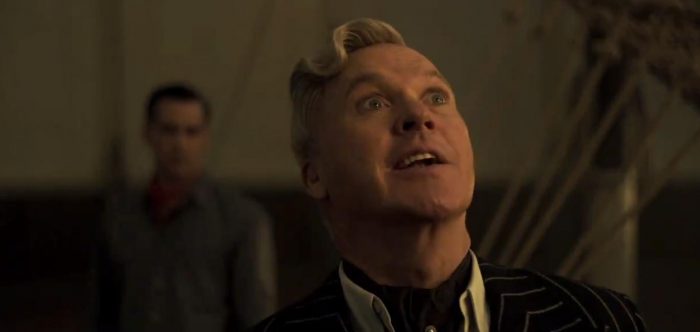 What do you guys have next after Dumbo?Justin Springer: To be determined? Nothing. Yeah. Yeah. I mean I have to maintain a slate of projects, but nothing that's announced...You have a lot of projects that we have been writing about for like ten years...Justin Springer: You're ribbing me now. I know...I mean I want to see Paladin, I want to see The Hill, are those ever going to happen?Justin Springer: I mean, look, development is hard, even when it's stuff that the studio [wants]. It's about timing. It's about getting a screenplay, right? I mean the great thing on Dumbo is Ehren came in with a really solid pitch and in that story was realized quite beautifully quickly. And then Tim came on to the movie and then also these sort of re-imaginings and remix, it really has taken off, right? So that's just like all of all the stars sort of aligned and there's lots of stuff that I'm developing some closer than other things to be made, all for Disney. But it's just about getting, you know, these are big, many of them are classics, and they're big important business propositions to the studio. It's just about kind of getting them in a place where everybody's ready to move forward on them. So we'll see.
What do you guys have next after Dumbo?Justin Springer: To be determined? Nothing. Yeah. Yeah. I mean I have to maintain a slate of projects, but nothing that's announced...You have a lot of projects that we have been writing about for like ten years...Justin Springer: You're ribbing me now. I know...I mean I want to see Paladin, I want to see The Hill, are those ever going to happen?Justin Springer: I mean, look, development is hard, even when it's stuff that the studio [wants]. It's about timing. It's about getting a screenplay, right? I mean the great thing on Dumbo is Ehren came in with a really solid pitch and in that story was realized quite beautifully quickly. And then Tim came on to the movie and then also these sort of re-imaginings and remix, it really has taken off, right? So that's just like all of all the stars sort of aligned and there's lots of stuff that I'm developing some closer than other things to be made, all for Disney. But it's just about getting, you know, these are big, many of them are classics, and they're big important business propositions to the studio. It's just about kind of getting them in a place where everybody's ready to move forward on them. So we'll see.
